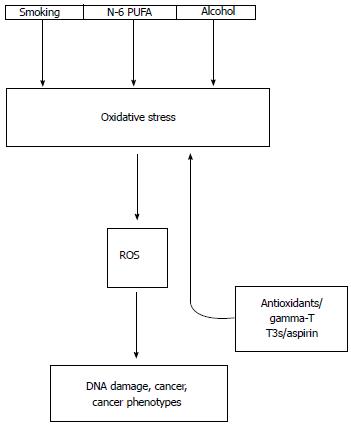Copyright
©2014 Baishideng Publishing Group Co.
World J Gastrointest Oncol. Mar 15, 2014; 6(3): 55-66
Published online Mar 15, 2014. doi: 10.4251/wjgo.v6.i3.55
Published online Mar 15, 2014. doi: 10.4251/wjgo.v6.i3.55
Figure 1 Connections between known risk factors of colorectal cancer and oxidative stress.
Smoking, dietary n-6 polyunsaturated fatty acids (n-6 PUFA) and heavy alcohol consumption contribute to in vivo oxidative stress with an accompanying overproduction of genotoxic reactive oxygen species (ROS) that give rise to mutations, cancer and also promote cancer phenotypes. Antioxidants such as gamma-tocopherol (gamma-T), tocotrienols (T3s) and aspirin reduce oxidative stress and ROS overproduction (up arrow).
- Citation: Stone WL, Krishnan K, Campbell SE, Palau VE. The role of antioxidants and pro-oxidants in colon cancer. World J Gastrointest Oncol 2014; 6(3): 55-66
- URL: https://www.wjgnet.com/1948-5204/full/v6/i3/55.htm
- DOI: https://dx.doi.org/10.4251/wjgo.v6.i3.55









